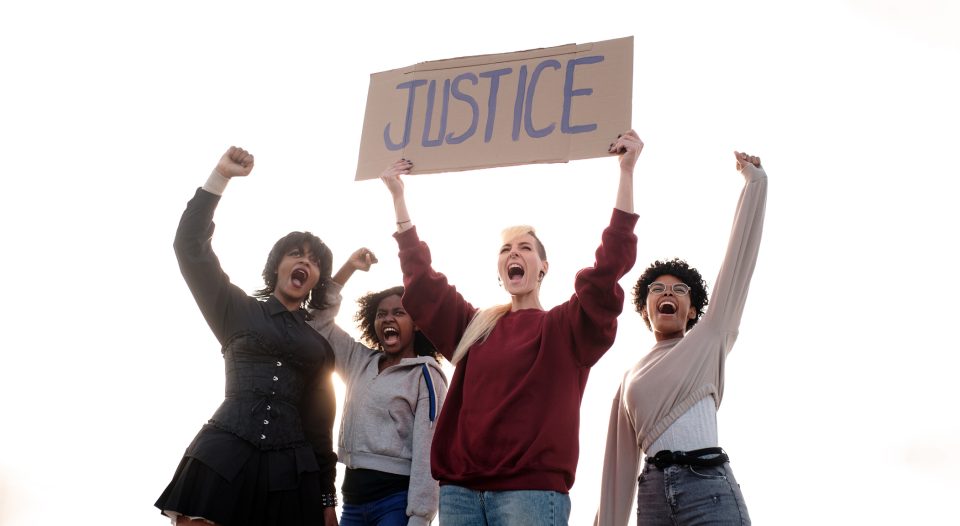Lectionary for Oct. 2, 2022
17th Sunday after Pentecost
Habakkuk 1:1-4, 2:1-4; Psalm 37:1-9;
2 Timothy 1:1-14; Luke 17:5-10
How can God allow those who do evil to succeed, and those who do good to suffer? No matter our theologies, on some level, the delay or denial of justice is offensive to humans.
As an example, I’ve been reading a few articles detailing evidence about sentencing differences based on wealth and race for similar crimes. It probably comes as little surprise that the U.S. justice system is hardly blind and gives poorer Black and Brown folks harsher sentences for the same crimes than it gives wealthier white folks. This makes me furious! Race or wealth shouldn’t be a factor in meting out justice, but it is. Right should be rewarded, and wrong should be punished fairly—but they aren’t, and that is offensive.
We aren’t alone in being offended by a lack of justice. The subjects of Scripture ask the same questions we do. And Scripture isn’t univocal—we receive as many answers as there are questioners. This week’s lectionary text provides at least three responses to the question “Where is my justice?”
The prophet Habakkuk surveyed ancient Judah and didn’t like what he saw. He lived in what he perceived as an unjust society. God’s law was ignored, the wicked surrounded the righteous on all sides, and justice was confused and meted out unfairly (Habakkuk 1:4). That might sound familiar. But what is fairly normal for us simply can’t be tolerated by prophets. Rabbi Dr. A.J. Heschel explains:
Indeed, the sort of crimes and even the amount of delinquency that fill the prophets of Israel with dismay do not go beyond that which we regard as normal, as typical ingredients of social dynamics. To us a single act of injustice—cheating in business, exploitation of the poor—is slight; to the prophets, a disaster. To us injustice is injurious to the welfare of the people; to the prophets it is a deathblow to existence: to us, an episode; to them, a catastrophe, a threat to the world. (Prophets, 1969).
Habakkuk couldn’t fathom how God could wait around and allow this injustice and violence. The prophet demands to know, “How long, Lord, have I called for help, and you do not hear? I cry out to you, ‘Violence!’ yet you do not save” (1:2).
Yet, God had already agreed with Habakkuk that something needed to be done and was preparing a response: the Chaldeans would come and overthrow the corrupt society (1:6). To Habakkuk, this made no sense. How could more violence solve violence? As a partial answer, God gave a simple message that could be easily written and memorized (2:2): the souls of the prideful are not right, but the righteous will live by faith (2:4). A time is coming, God told Habakkuk, when all injustice will be punished, and those who do righteousness will live. Yet, the destruction of Jerusalem and Judah was near-total, and the righteous were swept away with the wicked. Habakkuk wanted punishments for the wicked only, but the Babylonians didn’t seem to make a distinction.
We are to be faithful servants, pursuing God’s justice relentlessly and working to undermine injustice. That justice work doesn’t free us or save us. … Instead, it should be simply all in a day’s work for disciples of Jesus.
The psalmist takes a different approach to injustice. Instead of bewailing it, as Habakkuk did, the psalmist advises the hearer to not get upset because of evildoers and not be envious of wrongdoers (Psalm 37:1). Instead of dwelling on evil, the hearer should do good and live in faithfulness (37:3). Indeed, God will bring forth the righteousness of the faithful follower like light from a dark time (37:6). Essentially, the psalmist says, mind your own business, focus on yourself and do what you know is right. If you do justice, God will honor your work.
Jesus offers a third approach to rewards for justice and punishments for injustice. He appeals to common understandings in his context of the roles of servants. Does the master, after seeing that the servant has done one job all day, say to him, “Good work! Now relax and I’ll make you some dinner”? No, instead the master says, “I’m hungry. Fix me some dinner, put on your waiter outfit and serve me. Then you can eat and drink” (my paraphrase of Luke 17:7-8). In the same way, Jesus said, his followers are to regard themselves as not praiseworthy for doing what is right (17:10). If the righteous don’t receive any earthly reward, but instead are rewarded only with more work, this shouldn’t come as a surprise for Jesus’ followers.
What was Jesus’ reward for a perfectly sinless life? Crucifixion. And most of his early disciples followed him to a violent death. God will invite the faithful to the heavenly banquet, to be sure. But on earth, we shouldn’t expect special treatment.
We desperately want the just and good to prosper and the evildoers to be put to shame. I have to believe that the words of Mary’s song (Luke 1:46-55) and the ends of the parable of the rich man and Lazarus (Luke 16:19-31) will come to be. In the meantime, we are to be faithful servants, pursuing God’s justice relentlessly and working to undermine injustice. That justice work doesn’t free us or save us. We don’t assume the place of God because of our righteousness. Instead, it should be simply all in a day’s work for disciples of Jesus. If we ask, “Where is our justice?” Jesus says, it is in your hands. Get to work.





